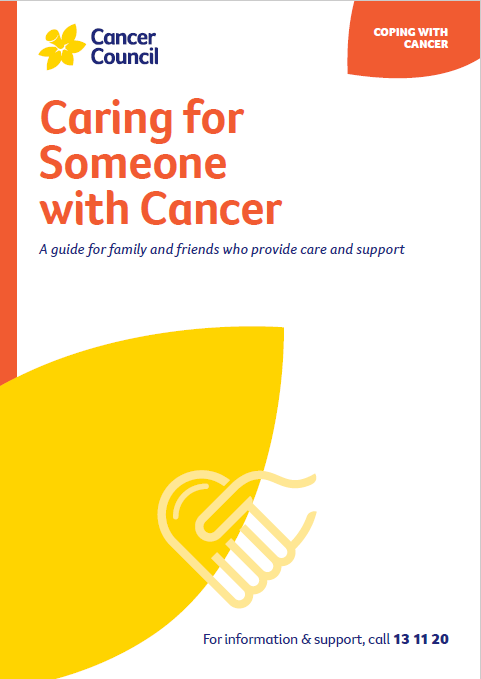- Home
- About Cancer
- Supporting someone with cancer
- Caring for someone with cancer
- Caring for yourself
Caring for yourself
Many carers say that providing care can affect their health and wellbeing, relationships, work and finances. Caring can be rewarding, but it may also be difficult at times, both physically and emotionally.
Learn more about:
- Overview
- If caring becomes too much
- Asking others for help
- Taking a break (respite care)
- Working while caring
- Keeping healthy
- When your caring role ends
Overview
It’s important to look after yourself. While you are busy looking after someone, you may downplay your own needs. You may feel as though your career, interests and health are no longer important or have to take second priority for a period of time.
It’s okay to acknowledge that you are not feeling well, without comparing it to how the person with cancer is feeling. Think about what you are comfortable helping with, the level of workload you can manage, and what your own needs are. You are allowed to say no.
If caring becomes too much
You might find providing care challenging. It may be that the physical demands are becoming too much, especially if you are older, have your own health issues, or are caring for other people.
You could also find that caring is emotionally exhausting. You may find it helpful to see a counsellor. They may help you see ways to make caring more manageable. Your GP or local Cancer Council can refer you to a counsellor. You can also try the Carer Gateway Counselling Service by calling 1800 422 737. For 24-hour crisis support, call Lifeline on 13 11 14.
Perhaps you know you need support but don’t want to disappoint the person you’re caring for. Learn ways to get practical help and support.
→ READ MORE: Asking others for help
Podcast: Cancer Affects the Carer Too
Listen to more episodes from our podcast for people affected by cancer
More resources
Dr Alison White, Palliative Medicine Specialist, Royal Perth Hospital, WA; Tracey Bilson, Consumer; Louise Dillon, Consumer; Louise Durham, Nurse Practitioner, Palliative Care Outpatients, Princess Alexandra Hospital, QLD; Katrina Elias, Carers Program, South Western Sydney Local Health District, NSW Health, NSW; Jessica Elliott, Social Worker, Youth Cancer Services, Crown Princess Mary Cancer Centre, Westmead Hospital, NSW; Brendan Myhill, Social Worker and Bereavement Research Officer, Concord Repatriation General Hospital, NSW; Penny Neller, Project Coordinator, National Palliative Care Projects, Australian Centre for Health Law Research, Queensland University of Technology, QLD; Olivia Palac, Acting Assistant Director, Occupational Therapy, Gold Coast University Hospital, QLD; Nicole Rampton, Advanced Occupational Therapist, Cancer Services, Gold Coast University Hospital, QLD; Shirley Roberts, Nurse Consultant, Medical Oncology, Northern Adelaide Cancer Centre, SA; Dr Elysia Thornton-Benko, Specialist General Practitioner, and UNSW Research Fellow, NSW; Kathleen Wilkins, Consumer; Helen Zahra, Carers Program, South Western Sydney Local Health District, NSW Health, NSW.
View the Cancer Council NSW editorial policy.
View all publications or call 13 11 20 for free printed copies.

